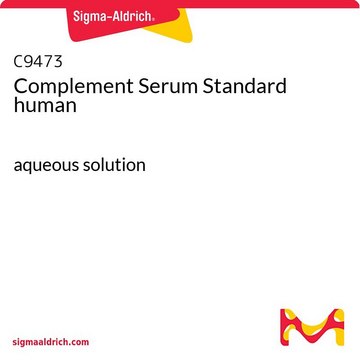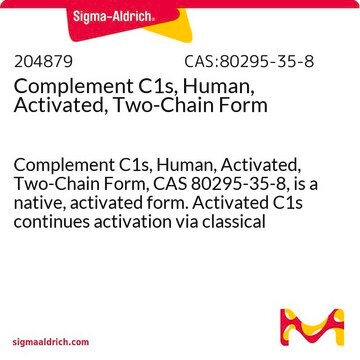C5938
Complement factor I from human plasma
>90% (SDS-PAGE)
Sign Into View Organizational & Contract Pricing
All Photos(1)
About This Item
CAS Number:
MDL number:
UNSPSC Code:
12352204
NACRES:
NA.54
Recommended Products
Application
Complement factor I from human plasma has been used in a case study of glucose-starved Staphylococcus aureus. Complement factor I from human plasma has also been used to study the human complement cascade of proteolysis as a target of laser irradiation.
Biochem/physiol Actions
Protease which cleaves and inactivates C3b and C4b
Physical form
Supplied as a 1mg/ml solution in PBS, pH 7.2
Other Notes
View more information on the complement pathway at www.sigma-aldrich.com/enzymeexplorer
Disclaimer
RESEARCH USE ONLY. This product is regulated in France when intended to be used for scientific purposes, including for import and export activities (Article L 1211-1 paragraph 2 of the Public Health Code). The purchaser (i.e. enduser) is required to obtain an import authorization from the France Ministry of Research referred in the Article L1245-5-1 II. of Public Health Code. By ordering this product, you are confirming that you have obtained the proper import authorization.
Storage Class Code
10 - Combustible liquids
Flash Point(F)
Not applicable
Flash Point(C)
Not applicable
Choose from one of the most recent versions:
Already Own This Product?
Find documentation for the products that you have recently purchased in the Document Library.
Customers Also Viewed
Valérie Leroy et al.
Pediatric nephrology (Berlin, Germany), 26(3), 419-424 (2010-12-29)
The development of membranoproliferative glomerulonephritis (MPGN) is associated with uncontrolled activation of the complement alternative pathway. This dysregulation is related either to C3 nephritic factor (C3NeF), an auto-antibody directed against the alternative C3 convertase, or to homozygous loss-of-function mutation of
No evidence of association between complement factor I genetic variant rs10033900 and age-related macular degeneration.
Valentina Cipriani et al.
European journal of human genetics : EJHG, 20(1), 1-2 (2011-10-13)
Maren Sullivan et al.
Annals of human genetics, 75(6), 639-647 (2011-09-13)
Hereditary atypical hemolytic uremic syndrome (aHUS), a dramatic disease frequently leading to dialysis, is associated with germline mutations of the CFH, CD46, or CFI genes. After identification of the mutation in an affected aHUS patient, single-site gene testing of relatives
G S Reusz et al.
Transplantation proceedings, 43(4), 1247-1249 (2011-05-31)
Hemolytic uremic syndrome (HUS) is a rare disease with various etiologies, making the identification of the specific forms and appropriate treatment difficult. Therefore, clinical and laboratory data from these patients need to be analyzed in national and international registries. Herein
Stephan Michalik et al.
Molecular & cellular proteomics : MCP, 11(9), 558-570 (2012-05-05)
The cellular amount of proteins not only depends on synthesis but also on degradation. Here, we expand the understanding of differential protein levels by complementing synthesis data with a proteome-wide, mass spectrometry-based stable isotope labeling with amino acids in cell
Our team of scientists has experience in all areas of research including Life Science, Material Science, Chemical Synthesis, Chromatography, Analytical and many others.
Contact Technical Service








